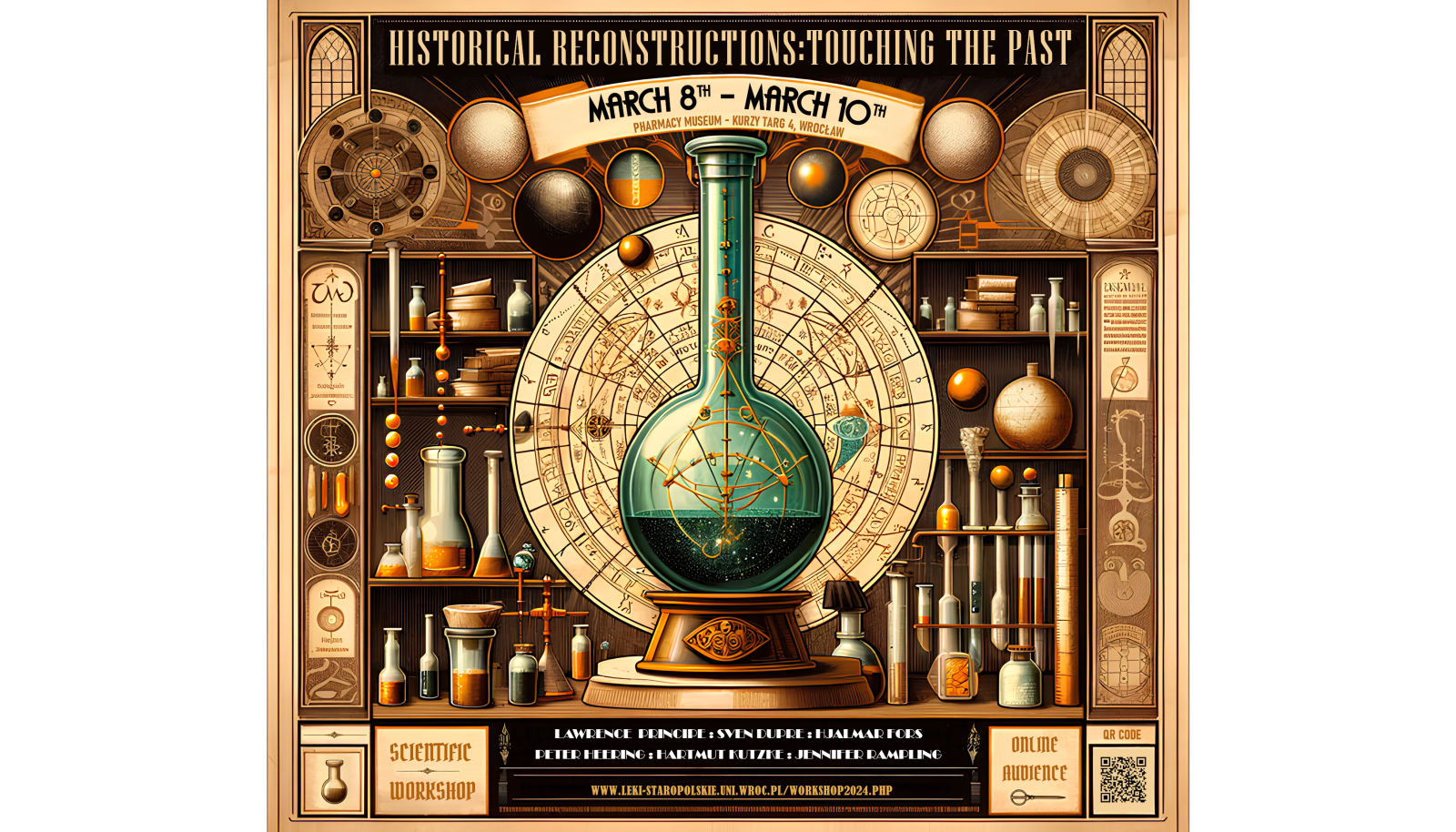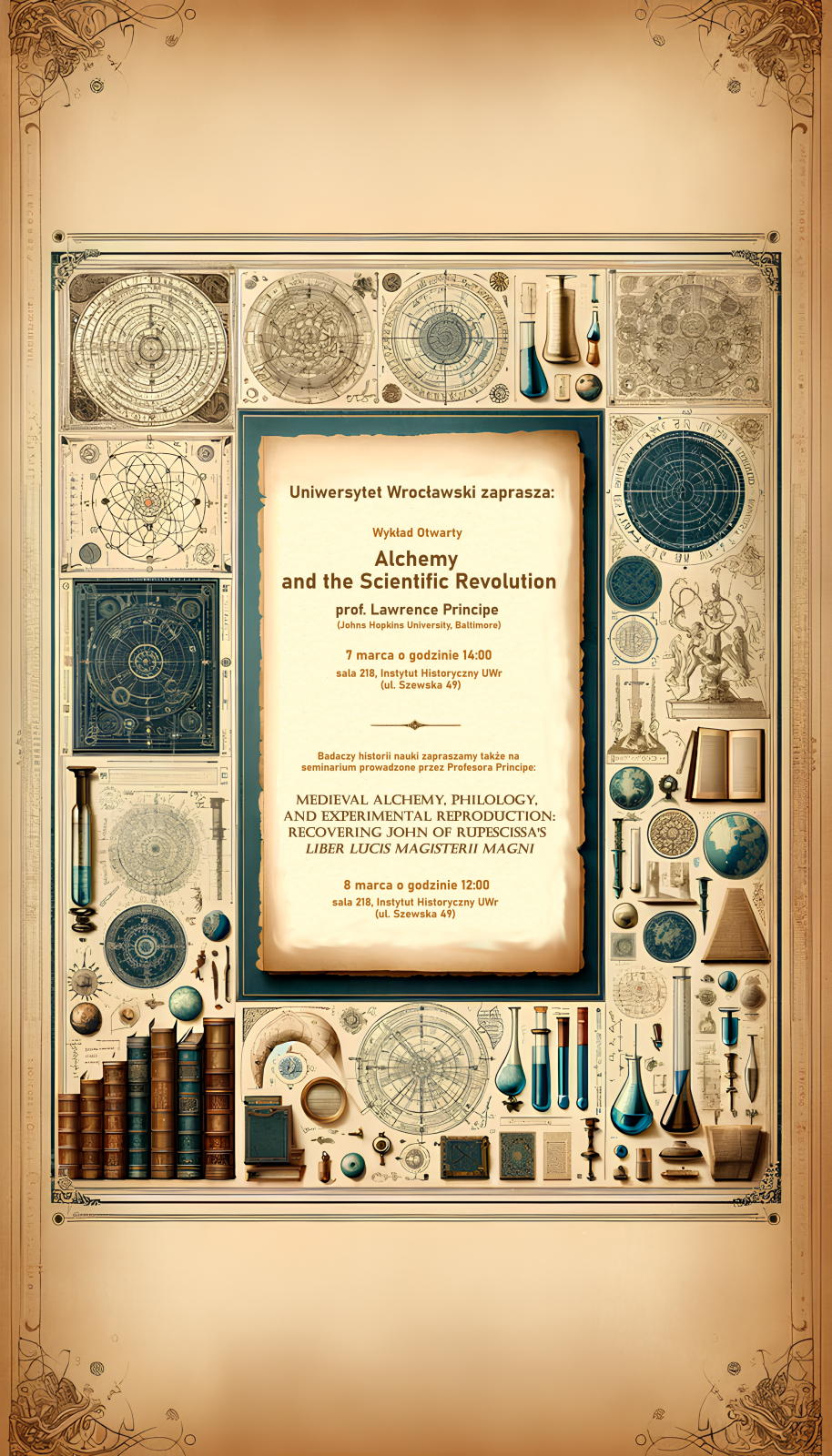
Touching the past – a matter of historical reconstructions
Workshops dedicated to the reconstruction of medieval medicines are just one element of the March conference co-organised by the University of Wrocław, the Medical University, and the Museum of Pharmacy. The main idea of the event, held from March 8th to 10th, 2024, under the theme “Dotknąć przeszłość – rzecz o historycznych rekonstrukcjach” (“Historical Reconstruction: Touching the Past”), is to create a platform for the exchange of experiences for scientists from various fields using reconstruction methods as research tools.
Of particular interest is the lecture by one of the conference guests, prof. Lawrence Principe, on March 7th (details on the poster).
The conference is also a part of summarising a research project funded by NCN, led by our researcher dr Jakub Węglorz, an assistant professor in the Department of Polish and Universal History of the 16th-18th centuries at the Institute of History, University of Wrocław, whose research interests focus on the issues of medicine and drugs in early Polish times, as well as the history of mentality of the modern era.
The research, which is part of the concluding project “Reconstruction and analysis of medicinal preparations identified based on ego documents of the early Polish era (16th-18th century)” was conducted by an interdisciplinary team, consisting of researchers from the fields of history and pharmacy from academic centers in Wrocław and Poznań. During the project, historical and laboratory research was conducted to reconstruct medicines used in the Polish-Lithuanian Commonwealth during the 16th-18th centuries, followed by the analysis of the active compound contents and the basic biological activity of the reconstructed preparations.
Workshops during the conference are specially designed for researchers whose interests include the reproduction of historical crafts, science, and art. Scientists will listen to each other, exchange experiences, and observations. Specialists in history, medicine, chemistry, archaeology, anthropology, art history, and sociology will meet to present their innovative research approaches to selected issues, not only drug reconstructions but also, for example, confectionery or measuring devices.
Historical reconstructions allow various scientific disciplines to be connected, and researchers have the opportunity to look at the period or object of interest from different perspectives.
The meeting is of great importance in building understanding among scientists from different fields of science.
What will scientists focus on during the March conference in Wrocław?
They will discuss not only ancient pain relievers, “sporting” creams, or massage oils created based on Greek and Roman medical recipes but also the reconstruction of Byzantine deodorant. There will also be no shortage of alchemy in scientific, social, or symbolic contexts, for example, “dreams of gold”.
The sweet side of historical reconstruction promises to be attractive. Scientists will answer the question of whether medieval sweets can be recreated. One researcher will present “Challenges of historical forms of gingerbread from Silesia”. Other scientists will talk about various approaches to art and craftsmanship, including mysteries of Viking tapestries or timeless time-measuring devices.
Read also: Leki staropolskie (uni.wroc.pl)
Particularly interesting is the lecture on March 7th, during which one of the conference guests, prof. Lawrence Principe (affiliation: Johns Hopkins University, Department of the History of Science and Technology and Department of Chemistry), will talk about “Alchemy and the Scientific Revolution” (lecture in English). We invite you on Thursday, March 7th, to room 218 at the Historical Institute at 14:00.
In addition to the lecture, prof. Principe will lead a seminar at the Institute of History on Friday at noon (room 218) on Medieval Alchemy, Philology, and Experimental Reproduction: Recovering John of Rupescissa’s Liber lucis magisterii magni.
Compiled by Katarzyna Górowicz-Maćkiewicz
Translated by Karolina Łodyga (student of English Studies at the University of Wrocław) as part of the translation practice.




